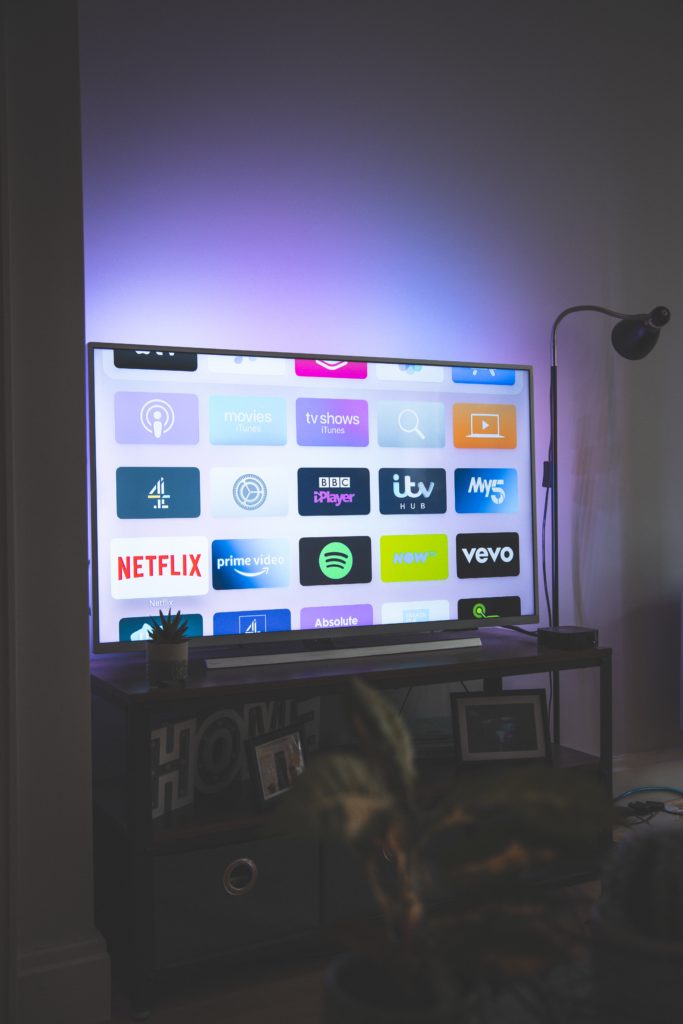
Entertainment, rest, and leisure are something humans have enjoyed since the beginning of time, though mostly in the form of physical activities (sports, gardening, carpentry), social gatherings (parties, festivals, concerts), or other popular hobbies (reading, fishing, crafting). Taking time to unwind from the daily grind is important for our well-being. God knows this and modeled it by resting on the seventh day and declaring it holy (Genesis 2:2-3).
Problems arise, however, when pastimes occupy most of our time. When they take our focus and energy away from the work we are supposed to do, the roles we are called to fulfill, and the responsibilities we are assigned to manage. When they negatively impact the way we think, feel, speak, believe, and behave. When these worthless things don’t contribute positively to our life, it is probably time to pull the plug (Psalm 119:37).
Perhaps the strongest force of leisure to unplug comes from the television.
With endless options available at our fingertips, we must be discerning of the content we consume as well as its effect on our mental, emotional, physical, and spiritual well-being. The enemy never sleeps and his influence is widely seen across our TV screens and tech devices, looking for ways to devour any idle mind or weak soul (1 Peter 5:8). Don’t let the enemy steal your joy or rob you of your time, peace, or purpose. Rather, ask for wisdom (James 1:5) and your convictions will be revealed.
8 Signs It’s Time to Turn Off That TV Show

#1 TV is consuming your time
You know that to-do list that keeps piling up because you don’t want to tackle it? That email you need to respond to? That family member you should visit? That church service you haven’t attended since the pandemic?
If you answered “yes” to any of these questions or if they sparked similar considerations, then chances are good you are not stewarding your time well or efficiently. You may think you can get to those other things tomorrow or save them for when you find more time, but the truth is, the only time you are guaranteed is the moment you are experiencing right now (James 4:13-14).
How will you make the most of it?
#2 TV is turning you into a pessimist
The news is filled with stories of pain, suffering, death, disaster, conflict, and tension while TV shows thrive off drama. It doesn’t matter if what you’re watching is pretend or reality, exposing yourself to this type of dark, evil, or destructive content can spark fear, anxiety, anger, contempt, cynicism, devastation, desensitization, and other negative feelings of hopelessness and despair.
Don’t let what you hear and see on TV turn you into a Debbie Downer, Negative Nancy, or Fearful Frances.
Instead, tune into the Spirit and focus on the things that are good, right, and true (Phillipians 4:8).
#3 TV has distorted your reality
Whether you’re watching reality shows, celebrity documentaries, romantic comedies, or other fictional programming, TV can play a role in how you perceive real life to be.
Unrealistic expectations, feelings of adequacy, and comparison are just a few ways TV can skew your view of reality and make you believe you can have it all, be it all, or experience it all.
The reality is life is not like a TV show no matter how real it may appear on TV. We must remember there are always scrips to follow, characters to portray, costumes to wear, make-up that covers up, lighting that illuminates, angles that hide, and numerous “special effects” that enhance and advance what you end up viewing on your screen at home.
We are called to focus on the things that are unseen, not seen. The things that are eternal and will renew our spirits rather than rot our brains, harm our bodies, or cause our spiritual decay (2 Corinthians 4:16-18).

#4 TV is affecting your relationships
Is TV causing you to think, speak, or act poorly towards those you love?
We may not realize it at first, but over time and with consistent exposure, political commentary and controversial themes seen throughout American culture can influence, impact, and affect the relationships we have with the people we do life with.
However, news, politics, and culture aren’t the only elements that can harm a healthy relationship. Fictional and “reality” shows are equally as guilty and can cause feelings of lust, shame, anger, embarrassment, resentment, discontentment, hatred, bitterness, intolerance, or apathy towards oneself or those you interact with. Similarly, TV can encourage abandonment of one’s roles or responsibilities, support toxic thoughts and feelings, contribute to isolation or lack of socialization, and nurture behavioral addictions.
As Paul says, put off your old self and old ways of doing things. By removing corrupt thoughts and deceitful desires, the new self can live as “the one created according to God’s likeness in righteousness and purity of the truth” (Ephesians 4:22-23 CSB).
#5 TV has become your idol
Are you obsessed with a certain show (i.e. cult following)? Do you plan your entire day around a show’s release, forgoing any other commitments or responsibilities that may interrupt your sacred TV time? Has TV become your bestie? A comfort you can depend on that never rejects your company or passes judgement and always finds time to spend with you?
Our God is a jealous God who doesn’t share His throne with anyone or anything (Exodus 20:3-5). If you find yourself elevating your show or prioritizing your TV time above your earthly and spiritual responsibilities as a follower of Christ, it’s likely TV has become your idol.
TV shows can create modern-day idols of lust, addiction, fanaticism and more. If you’re unsure if a TV show has become your idol, review the other signs previously mentioned and consult the Holy Spirit for wisdom and conviction. As Jesus told His followers, where your heart is, there your treasure will be (Matthew 6:19-21).

#6 TV is feeding your addiction
Streaming services figured out early they could capitalize on a viewer’s addiction by releasing a “limited series” or “dropping” a complete television season on a set date. As predicted, the anticipation led viewers to crave more of their beloved show to the point where they’d become addicted and would consume more. “Binge-watching” became the lingo for this trend due to the countless hours spent watching numerous episodes, often in one sitting, of a single TV series. It was a genius way to keep butts in seats and eyes glued on screens.
Besides capturing interest for hours on end and keeping viewers addicted to their screen, there are other addictions TV can feed or problems that it glamorizes or even normalizes.
Depictions of drug abuse, alcoholism, pornography, pedophilia, infidelity, domestic abuse, suicide, mental illness, and eating disorders as well as profanity and other immoral acts or behaviors are regularly featured and often in a positive light. When certain themes, language, characters, or plotlines are portrayed episode after episode, they can negatively impact those with an addictive nature.
Additionally, it’s important to recognize that men are visual beings unlike women who tend to emotionally write themselves into the story. A man may get sucked into a particular TV show because of its consistent inclusion of gorgeous female actors, nudity, and soft pornographic scenes showcased in every episode. On the other hand, a woman may gravitate towards a show that emphasizes romantic narratives or dreamy male characters. Over time, both men and women can develop sexual and emotional attractions and addictions to what they witness on their TV screens, which can translate into desensitization, unrealistic expectations, and more of what was previously discussed in the warning signs found in # 3, 4, and 5.
Bottom line – bad company can corrupt good behavior and the same is true of what we see and hear on TV (1 Corinthians 15:33).
But God is always faithful and He will provide a way for you to escape any temptation that may attempt to led you astray (1 Corinthians 10:13).
#7 TV is shaping your worldview
Whether you realize it or not, everyone possesses a worldview. That is, a lens in which you see the world and consider the happenings within it. A worldview can be shaped from various influences and there are many different types of worldviews that exist, including the biblical worldview in which this article is written from. The main point, though, is there is no neutral worldview.
This is important because the shows we watch are filtered through a worldview. If we enjoy comedy TV shows, for instance, chances are good the humor we witness will poke fun at those who are marginalized or different than the preferred group of people featured. Often this includes those who are mentally inclined, overweight, underweight, socially awkward, politically incorrect, religiously affiliated, or of a targeted ethnic background. If jokes are repeatedly at the expense of a specific individual or group of people, the viewer is at risk of developing a certain feeling towards this person or people group without even realizing it. A fantastic example is the media’s opinion of America’s 45th President and those who voted for him.
It’s important to be conscious and cautious about the types of shows we are exposing ourselves to and to recognize how these shows are affecting our day-to-day lives as well as our outlook on life. This is equally true for the news we are ingesting or the news-centered documentaries we are watching. Everything is written and scripted through the lens of a particular worldview.
What is the message being communicated? Who is the intended audience? What is the show hoping to accomplish?
“Be sure you are not led away by the teaching of those who have nothing worth saying and only plan to deceive you. That teaching is not from Christ. It is only human tradition and comes from the powers that influence this world.”
Colossians 2:8 (ERV)

#8 TV is negatively impacting your health
It’s clear that TV can have negative consequences on one’s mental, emotional, relational, and spiritual health, but it can promote poor physical health habits and long-term conditions as well.
Since most people who watch TV do so while sitting or lying down, TV viewing enacts a sedentary lifestyle that can lead to drug and alcohol abuse, an unhealthy diet (undereating or overeating), a lack of fresh air, physical strain on one’s eyes and restricting one’s natural sleep-wake cycle, amongst other health risks.
Our bodies, in their entirety, should be used to honor God and glorify His name. Rather than take them for granted, we should care for them well. After all, our body is the temple where the Holy Spirit resides (1 Corinthians 6:19).

Each human has their own capacity, capabilities, vices, and virtues. Likewise, everyone is in a different season of life or stage in their faith journey. What is good for one person may not be good for another. In Romans 14, Paul offers some wise words to help us navigate what we should or should not do as we seek to live in the world rather than of the world (Romans 12:2).
That said, only you and God know your limits and what you can handle. If you’re experiencing any form of conviction, use it as a sign to hit “pause” as you discover the cause behind your interest in a particular show.
Ask yourself – Is this show contributing positively or negatively to my life? Is this show adding to my life (such as providing me with new information obtained by watching a documentary) or is it taking something away (like my joy, peace, or contentment?) Is this show providing me the relaxation and mind rest I’m seeking or is it binding me into a ball of fear or anxiety?
What is easy isn’t always what is best. Choose what is best and allow God to handle the rest.
*I originally wrote and published this article for iBelieve.com in February 2022.